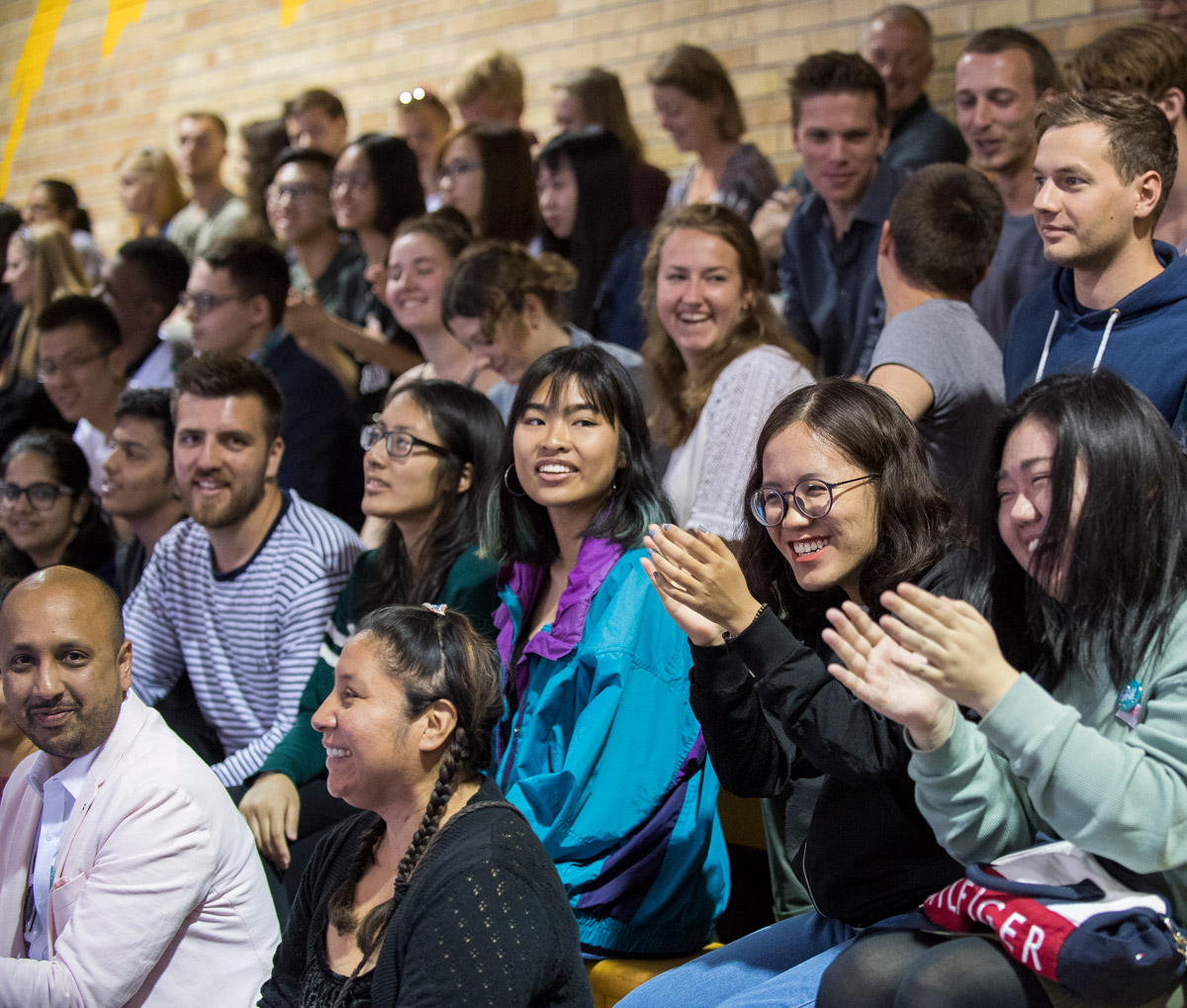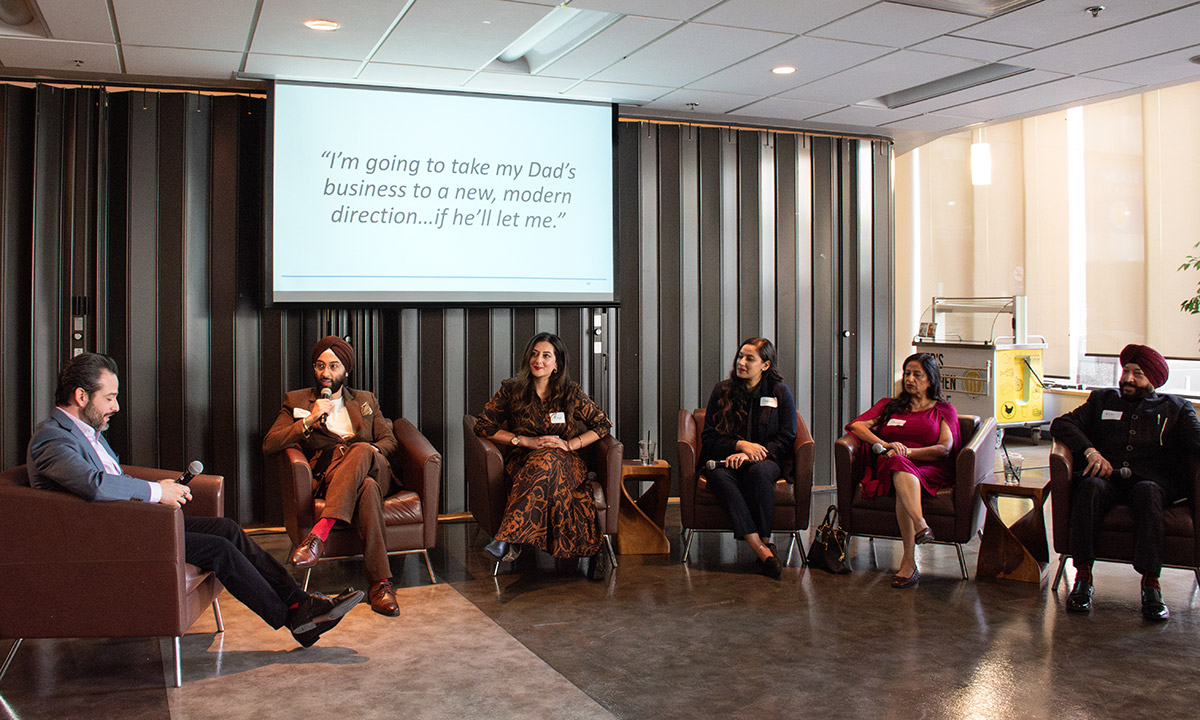C.A.R.E.
Educate
Educate
One of our primary objectives is to ensure that the EDI lens is incorporated in our education. Members of our faculty intentionally design curriculums and programs to be representative of culturally diverse perspectives and be inclusive to prospective students. One of the many strengths we have is staying abreast of emerging trends and issues and developing curriculums that are based on progressive and critical thought for our student community and equipping them to be change makers and leaders.

Inclusive teaching
Progressive developments to course delivery continue to be thoughtfully implemented at the Ted Rogers School. From course conception to curriculum design, our faculty continue to identify ways to offer innovative and inclusive learning opportunities to current and prospective students. Calls to action by equity-deserving communities are heard loud and clear by our faculty who champion decisions that close social gaps - in 2023-24 some important developments included offering STEM courses and bridging programs for racialized newcomer women to establishing more inclusive admission criteria.
Professional bridging programs for newcomer women
The Executive and Corporate Education program has started facilitating a mini-Master’s program aimed at preparing racialized newcomer women for employment in health care. The Foundations of Health Administration and Community Care Mini-Masters will be offered to 40 racialized newcomer women through the Sister2Sister Advanced Leadership Program (external link, opens in new window) , offered by Newcomer Women’s Services Toronto. This program bridges the gap between employer needs and newcomer women skills through intensive training in soft and hard skills. The program serves highly-skilled newcomer women, with a minimum of a Bachelor’s degree, and several years of work experience, who are faced with multiple barriers when accessing the workforce in Canada.
Cybersecurity sector work training for women and gender diverse people
The Cybersecurity Research Lab has partnered with the Information Communications Technology Council of Canada (ICTC) to offer the Cybersecurity Training and Work Integrated Learning (CTWIL) program, which provides women and non-binary post-secondary education students with access to Microsoft training and certification examinations, along with a 16-week paid work-integrated learning placement in the cybersecurity sector. It is a perfect opportunity for students to build their network, find mentors and get exposure to the field.
Removing barriers to admission for post-graduate accounting students
Effective Winter 2024, the admission criteria for the Professional Master's Diploma in Accounting (PMDip) was updated to eliminate the requirement to admit only graduates from the Ted Rogers School of Management School of Accounting and Finance or those who graduated with a major in Accounting or Business Management. The new admission criteria is now broadened with the following more inclusive eligibility requirements:
- Ted Rogers School graduates who did not major in accounting, but completed all the prerequisite accounting courses required by the CPA Ontario are now eligible to apply for admission.
- Students of undergraduate programs delivered by other post-secondary institutions provided that the other institution’s courses have been assessed by the program as substantially equivalent to the Ted Rogers School’s undergraduate courses, and their courses have been verified by the CPA Ontario or another Canadian province or region for entry into the CPA PEP.
- Recent immigrants and working adults who completed prerequisite courses at the TMU Chang School are now eligible to apply for admission.
These changes produced the intended outcomes, with one-third of students in the 2024 spring/summer cohort made up of external candidates. This positive impact to more inclusive enrollment also resulted in an increase in diversity among the cohort, which enriched the learning environment.

Curriculum changes in Hospitality and Tourism Management
In 2023-24, the HTM curriculum redevelopment lead by Dr. Frédéric Dimanche, made the following changes: the courses HTH 700 (Professional Ethics in Hospitality and Tourism Management) and HTT 510 (Sustainable Tourism Development) moved from being Core Electives to required courses in the program. Both courses have substantial content related to diversity, equity and inclusion. HTH 503 (Human Resources Administration) now includes sections on leading diverse employees, ensuring accommodating and accepting work environments, ensuring a legal and ethical workplace and providing inclusive training and development.
All courses in the HTM program have been ensured that EDI learning objectives are featured across the curriculum. Specifically, HTR 841 (Research & Data Analysis) now includes simulations which incorporate sustainability and ethics principles, and an Indigenous, accessible tourism and EDI-based hiring cases.
- Does the U.S. Hospitality Market Offer Fertile Soil for Lemon Tree Hotels’ Inclusive Business Model? By David A. Wernick and Siddharth K. Upadhyay
- Thomas Cook Group: Do Insiders or Outsiders Make Better CEOs? By Wiboon Kittilaksanawong, Kinley Bidha
- The High Flyer & the Generation Gap. By Paul Lim
- How Inclusive Is Your Leadership? By Salwa Rahim Dillard
- Historic Lund Resort at Kla ah men: Building Sales and Hiring Appropriate Management. By Elizabeth Bowker
- Recognizing Leadership Styles. By Konstantin Korotov
HTM also offers an Indigenous Tourism Core Elective course as part of our HTT 600 Special Topics in Hospitality and Tourism course.

New course and group exercise
Dr. Francesco Barbera, in collaboration with Janie Goldstein implemented a new course group project in ENT 501 which asks students to interview family business leaders and garner their opinions on key challenges, survey them on their governance structures and processes, ask about Toronto characteristics that contribute to their success (diversity is one of the options) and also understand their desires for additional education. Respondents were asked about their birth country and the birth country of their parents. Many of the respondents were not born in Canada, or their parents were not born in Canada. Students were asked to report their findings and in one section, specifically comment about diversity. This allowed the researchers to see what diversity meant to the students and how they could interpret the data they received through a diversity lens.
